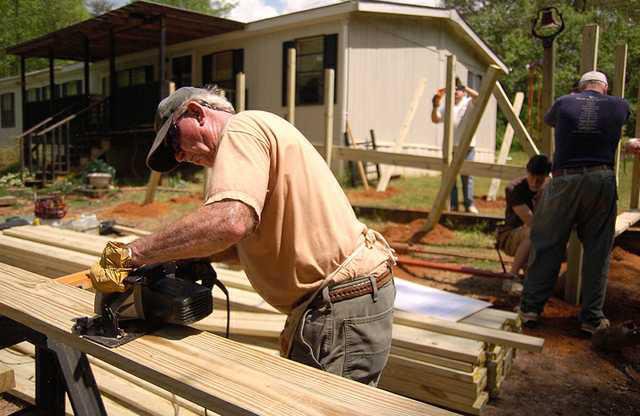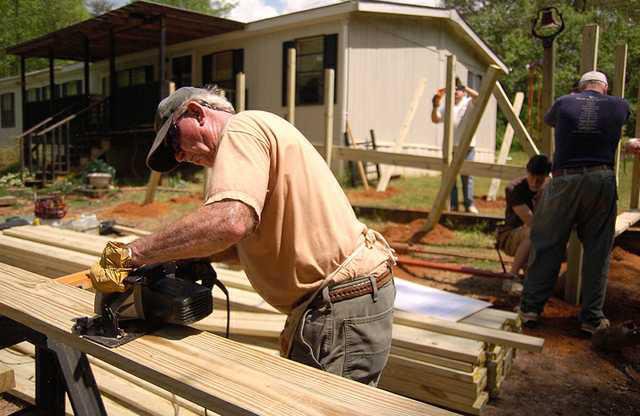ALTO — Annette Free said her husband, Tommy, used to “piddle out in the yard” at their home off Ga. 365 in Hall County near the Habersham County line.
Then, a series of serious health problems struck, limiting his mobility and draining the couple financially.
Life could get a bit easier soon for the couple, as volunteers with the Gainesville Rotary Club are building a 44-foot wooden ramp to help Tommy Free get in and out of the house easier.
“I get dizzy going down steps,” such as the ones that fall off steeply in front of the couple’s home, he said.
With the new ramp, “he can walk easily and he can hold (the railing) and be level, go straight and not have to look down,” his wife said.
The project is the club’s biggest one so far in the 1 1/2 to two years the club’s program has been under way, with this latest effort starting Friday and possibly ending today.
The program began a couple of years ago after club members heard from Madison County Rotarians who started a similar ramp-building program nearly 15 years ago and have built some 400 ramps so far.
“They are really good at it,” said Brian Gracey, a Gainesville Rotarian and architect.
The Gainesville club was inspired to start its own program.
“The whole object of it is to provide a community service of helping people with disabilities who have mobility issues and who have very little (financial) resources,” said Gracey, who co-chairs the club’s Ramp Committee with contractor Dick Young.
“We started off thinking that (mission) automatically meant somebody was in a wheelchair and therefore needed our help,” Gracey said. “But what we have found since then is there ... are a full range of ailments that can cause a person to have difficulty walking or (taking) steps.”
The club’s “aim is to restore some measure of mobility for (the disabled),” he added.
“If they can’t get out of their house, they’re homebound, which is very debilitating in its own way,” Gracey said.
“We’re not in the ramp-building business,” Young added. “... We’re trying to help people who can’t help themselves.”
The club goes through social-service agencies to find needy residents.
“We have no way of determining financial capability, but if somebody is on food stamps, then (the agency) has already determined what their situation is,” Gracey said.
The club has built 18 ramps since the program started, with building material costs varying between $300 and $1,000 or so per job.
The bill for the Frees’ ramp — featuring two ramp sections and a landing consisting of 114 decking pieces — could hit nearly $1,500.
The money is pulled from the club’s budget, which is based on membership dues, and all work is voluntary. Plus, workers bring their own tools.
“When we finish a project, we’ll get (disabled clients) to use the ramp for the first time,” Young said. “It’s really delightful ... to see the smile on their faces as they come down. They’re very grateful.”
The club asks if it’s possible for the recipients to donate any amount of money toward the materials.
“I think that helps them become part of the project,” Young said. “Self-esteem is very important.”
The Frees, who have lived in their home for 33 years, said they are grateful for the Rotarians’ effort.
“It’ll really make it easier on me,” Tommy Free said.

